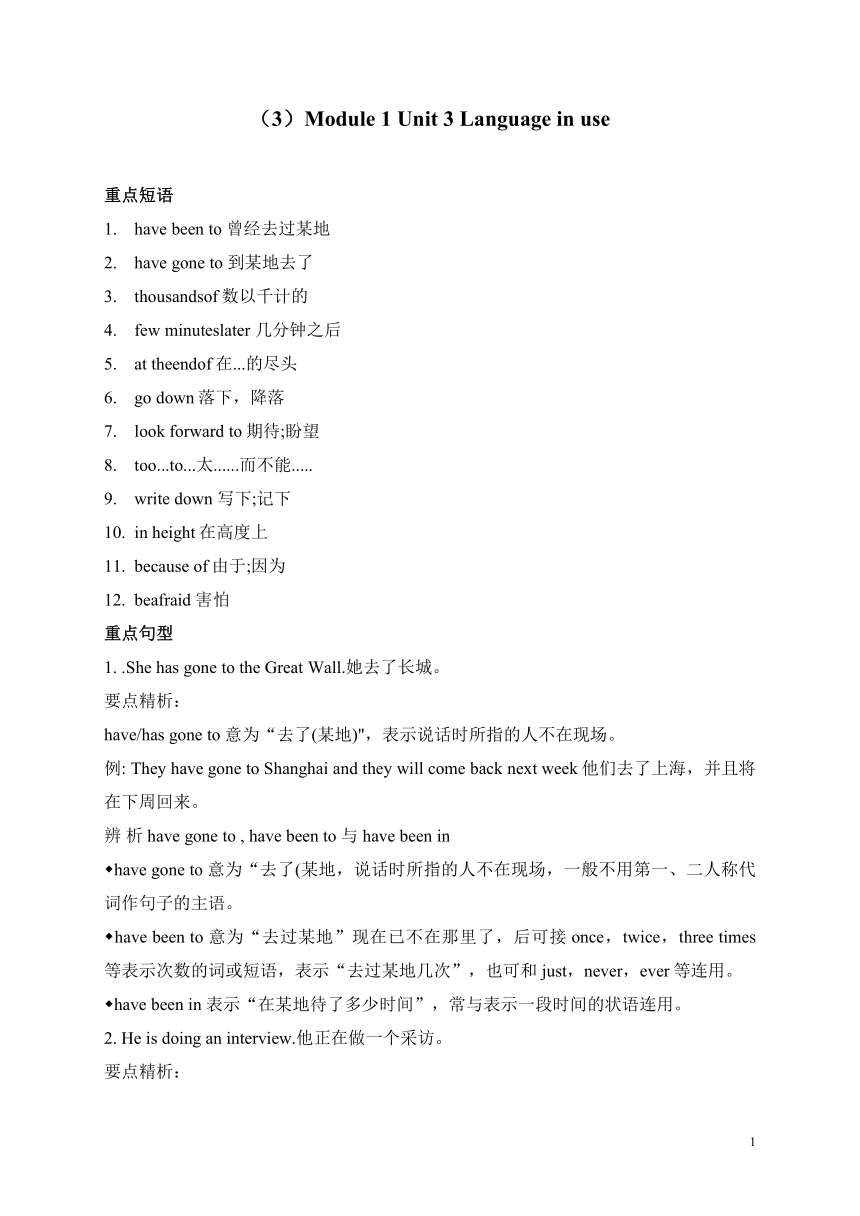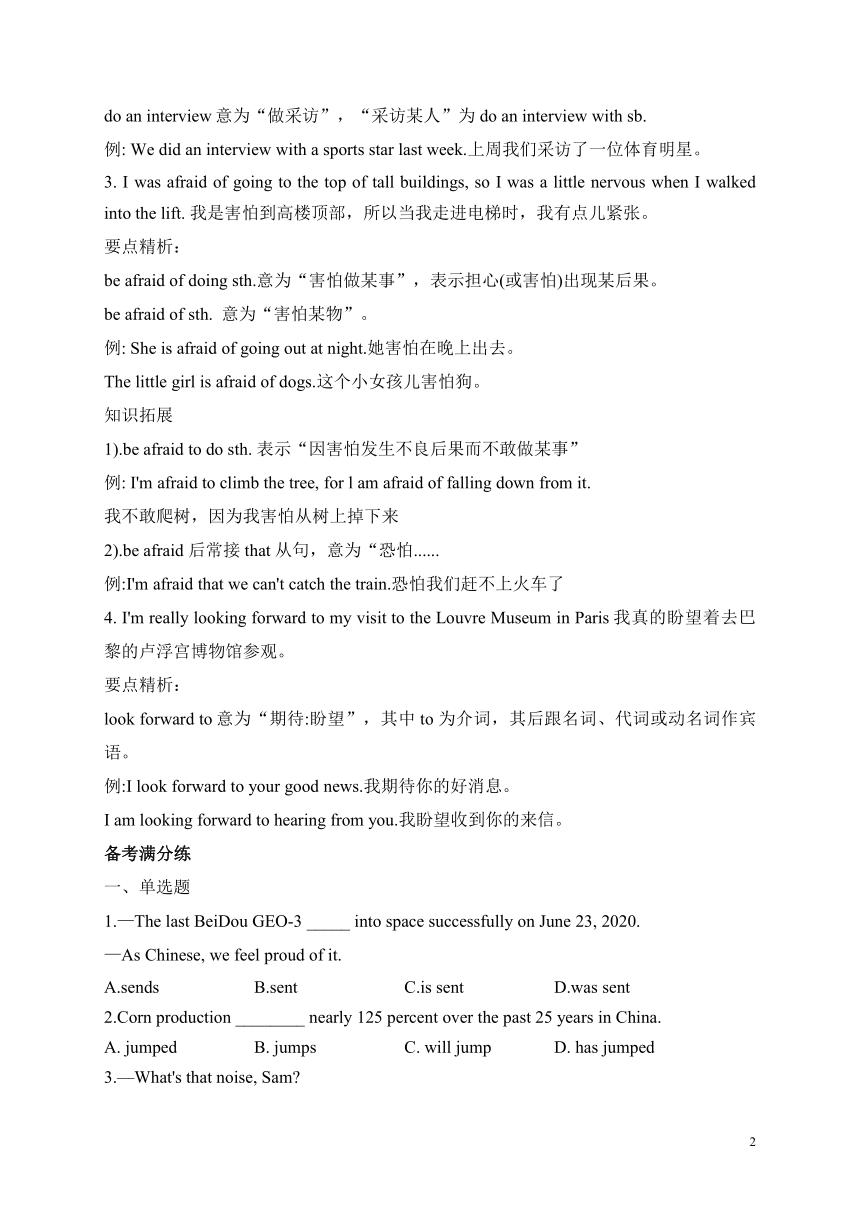Module 1 Unit 3 Language in use 初中英语牛津译林版九年级上册单元练习(含解析)
文档属性
| 名称 | Module 1 Unit 3 Language in use 初中英语牛津译林版九年级上册单元练习(含解析) |  | |
| 格式 | docx | ||
| 文件大小 | 26.5KB | ||
| 资源类型 | 教案 | ||
| 版本资源 | 牛津译林版 | ||
| 科目 | 英语 | ||
| 更新时间 | 2023-09-13 16:40:10 | ||
图片预览


文档简介
(3)Module 1 Unit 3 Language in use
重点短语
have been to 曾经去过某地
have gone to 到某地去了
thousandsof数以千计的
few minuteslater 几分钟之后
at theendof在...的尽头
go down落下,降落
look forward to期待;盼望
too...to...太......而不能.....
write down 写下;记下
in height在高度上
because of由于;因为
beafraid 害怕
重点句型
1. .She has gone to the Great Wall.她去了长城。
要点精析:
have/has gone to 意为“去了(某地)",表示说话时所指的人不在现场。
例: They have gone to Shanghai and they will come back next week他们去了上海,并且将在下周回来。
辨 析have gone to , have been to 与 have been in
have gone to 意为“去了(某地,说话时所指的人不在现场,一般不用第一、二人称代词作句子的主语。
have been to 意为“去过某地”现在已不在那里了,后可接once,twice,three times等表示次数的词或短语,表示“去过某地几次”,也可和just,never,ever等连用。
have been in 表示“在某地待了多少时间”,常与表示一段时间的状语连用。
2. He is doing an interview.他正在做一个采访。
要点精析:
do an interview意为“做采访”,“采访某人”为 do an interview with sb.
例: We did an interview with a sports star last week.上周我们采访了一位体育明星。
3. I was afraid of going to the top of tall buildings, so I was a little nervous when I walked into the lift. 我是害怕到高楼顶部,所以当我走进电梯时,我有点儿紧张。
要点精析:
be afraid of doing sth.意为“害怕做某事”,表示担心(或害怕)出现某后果。
be afraid of sth. 意为“害怕某物”。
例: She is afraid of going out at night.她害怕在晚上出去。
The little girl is afraid of dogs.这个小女孩儿害怕狗。
知识拓展
1).be afraid to do sth. 表示“因害怕发生不良后果而不敢做某事”
例: I'm afraid to climb the tree, for l am afraid of falling down from it.
我不敢爬树,因为我害怕从树上掉下来
2).be afraid 后常接that 从句,意为“恐怕......
例:I'm afraid that we can't catch the train.恐怕我们赶不上火车了
4. I'm really looking forward to my visit to the Louvre Museum in Paris我真的盼望着去巴黎的卢浮宫博物馆参观。
要点精析:
look forward to意为“期待:盼望”,其中to 为介词,其后跟名词、代词或动名词作宾语。
例:I look forward to your good news.我期待你的好消息。
I am looking forward to hearing from you.我盼望收到你的来信。2
备考满分练
一、单选题
1.—The last BeiDou GEO-3 _____ into space successfully on June 23, 2020.
—As Chinese, we feel proud of it.
A.sends B.sent C.is sent D.was sent
2.Corn production ________ nearly 125 percent over the past 25 years in China.
A. jumped B. jumps C. will jump D. has jumped
3.—What's that noise, Sam
—My little brother __________ with his toy car now.
A. will play B. is playing C. plays D. played
4.I don't know the words to a lot of songs, but I do know some folk songs that my grandma ______ me at an early age.
A. teaches B. taught C. will teach D. has taught
5.—The coffee's finished!
—Oh, sorry! I _________to the shop to get some.
A. am going B. was going C. went D. have gone
6.Sam _______ with his friends every weekend.
A. skates B. is skating C. has skated D. was skating
7.—I will go to Guangdong for my summer holidays, mom.
—I will meet you when you ______ the airport.
A.will reach B.reaches C.reached D.reach
8.Bill likes reading. He _____ picture books with his dad every evening.
A. read B. reads C.is reading D. has read
9.While the lights ______ to red, a car suddenly appeared around the corner.
A. change B. have changed C.were changing D.will change
10.Next week, each student in the class _____ a small gift from their teachers.
A. receives B. received C. will receive D. has received
二、用所给词的适当形式填空
11.As I was trying to find my way out, I suddenly _______ some noise. (hear)
12.He has the most beautiful blue eyes I have ever ______ (see).
13.We will go to the cinema if it _______ (rain) tomorrow.
14.He is not here. He ______ (go) to the post office.
15.My mum hopes that I __________(be) happy and healthy in the future.
答案以及解析
一、单选题
1.答案:D
解析:考查时态和语态。句意:—最后一颗北斗GEO-3卫星于2020年6月23日成功发射升空。—作为中国人,我们为此感到骄傲。主语"The last BeiDou GEO-3"和动词send之间是被动关系,要用被动语态。由时间状语 on June 23, 2020"可知,用一般过去时的被动语态。故选D。
2.答案:D
解析:考查动词时态。句意:在过去的25年里,中国玉米的产量增长了近125%。根据时间状语 over the past 25 years可知,句中动词用现在完成时。故选D。
3.答案:B
解析:考查时态辨析。句意:—那是什么声音,山姆?—是我的弟弟,他现在正在玩他的玩具汽车。 will play玩,一般将来时;is playing现在进行时; plays一般现在时的第三人称单数形式; played一般过去时。对话的进行与声音的发出同时发生,所以应该用现在进行时;同时,标志词now提示的是现在正在发生的动作。故选B。
4.答案:B
解析:设空处所在句为that引导的定语从句,根据时间状语 at an early age可知,从句时态为一般过去时。故选B。
5.答案:A
解析:考查动词时态。句意:—咖啡已用完!—哦,对不起。我正要去商店买一些呢。由空格前面的sorry及后面的" to the shop to get some"可知,"我"正准备去商店买一些咖啡, be going to do sth.意为"打算做某事"。故选A。
6.答案:A
解析:时间状语 every weekend "每个周末"表示经常性的行为,应用一般现在时。故选A。
7.答案:D
解析:句意:—妈妈,我要去广东过暑假。—当你到达机场时,我会去接你。考查一般现在时。根据“I will meet you when you…the airport.”可知,这里是由when引导的时间状语从句,主句用一般将来时,从句用一般现在时表将来,主语是you(你),谓语动词用原形。故选D。
8.答案:B
解析:考查动词时态。由 every evening可知句子使用一般现在时,主语He是第三人称单数,所以动词使用第三人称单数形式。故选B。
9.答案:C
解析:考查动词时态。句意:当(交通)灯变红时,一辆汽车突然出现在拐弯处。 while引导时间状语从句时,从句中一般用进行时态。本句主句为一般过去时,因此从句中用过去进行时。故选C。
10.答案:C
解析:考查动词时态。根据时间状语" Next week"可知,本句描述的是将来发生的动作,要用一般将来时。其基本结构为"will+动词原形"。故选C。
二、用所给词的适当形式填空
11.答案:heard
解析:考查一般过去时。根据was可知主句用过去式,主句表示"我突然听见一些噪音"。hear的过去式是 heard。故填 heard。
12.答案:seen
解析:根据语境和句中时间副词ever确定是现在完成时,see的过去分词为seen。故填seen。
13.答案:rains
解析:在含有if引导的条件状语从句的主从复合句中,主句用一般将来时,从句用一般现在时表示将来。故填rains。
14.答案:has gone
解析:句意:他不在这里,他去邮局了。表示"某人去了某地"用have gone,主语是He,故填 has gone。
15.答案:will be
解析:句意:我妈妈希望我将来会快乐健康。根据 in the future"在未来"可知,从句用一般将来时态。故填will be。
重点短语
have been to 曾经去过某地
have gone to 到某地去了
thousandsof数以千计的
few minuteslater 几分钟之后
at theendof在...的尽头
go down落下,降落
look forward to期待;盼望
too...to...太......而不能.....
write down 写下;记下
in height在高度上
because of由于;因为
beafraid 害怕
重点句型
1. .She has gone to the Great Wall.她去了长城。
要点精析:
have/has gone to 意为“去了(某地)",表示说话时所指的人不在现场。
例: They have gone to Shanghai and they will come back next week他们去了上海,并且将在下周回来。
辨 析have gone to , have been to 与 have been in
have gone to 意为“去了(某地,说话时所指的人不在现场,一般不用第一、二人称代词作句子的主语。
have been to 意为“去过某地”现在已不在那里了,后可接once,twice,three times等表示次数的词或短语,表示“去过某地几次”,也可和just,never,ever等连用。
have been in 表示“在某地待了多少时间”,常与表示一段时间的状语连用。
2. He is doing an interview.他正在做一个采访。
要点精析:
do an interview意为“做采访”,“采访某人”为 do an interview with sb.
例: We did an interview with a sports star last week.上周我们采访了一位体育明星。
3. I was afraid of going to the top of tall buildings, so I was a little nervous when I walked into the lift. 我是害怕到高楼顶部,所以当我走进电梯时,我有点儿紧张。
要点精析:
be afraid of doing sth.意为“害怕做某事”,表示担心(或害怕)出现某后果。
be afraid of sth. 意为“害怕某物”。
例: She is afraid of going out at night.她害怕在晚上出去。
The little girl is afraid of dogs.这个小女孩儿害怕狗。
知识拓展
1).be afraid to do sth. 表示“因害怕发生不良后果而不敢做某事”
例: I'm afraid to climb the tree, for l am afraid of falling down from it.
我不敢爬树,因为我害怕从树上掉下来
2).be afraid 后常接that 从句,意为“恐怕......
例:I'm afraid that we can't catch the train.恐怕我们赶不上火车了
4. I'm really looking forward to my visit to the Louvre Museum in Paris我真的盼望着去巴黎的卢浮宫博物馆参观。
要点精析:
look forward to意为“期待:盼望”,其中to 为介词,其后跟名词、代词或动名词作宾语。
例:I look forward to your good news.我期待你的好消息。
I am looking forward to hearing from you.我盼望收到你的来信。2
备考满分练
一、单选题
1.—The last BeiDou GEO-3 _____ into space successfully on June 23, 2020.
—As Chinese, we feel proud of it.
A.sends B.sent C.is sent D.was sent
2.Corn production ________ nearly 125 percent over the past 25 years in China.
A. jumped B. jumps C. will jump D. has jumped
3.—What's that noise, Sam
—My little brother __________ with his toy car now.
A. will play B. is playing C. plays D. played
4.I don't know the words to a lot of songs, but I do know some folk songs that my grandma ______ me at an early age.
A. teaches B. taught C. will teach D. has taught
5.—The coffee's finished!
—Oh, sorry! I _________to the shop to get some.
A. am going B. was going C. went D. have gone
6.Sam _______ with his friends every weekend.
A. skates B. is skating C. has skated D. was skating
7.—I will go to Guangdong for my summer holidays, mom.
—I will meet you when you ______ the airport.
A.will reach B.reaches C.reached D.reach
8.Bill likes reading. He _____ picture books with his dad every evening.
A. read B. reads C.is reading D. has read
9.While the lights ______ to red, a car suddenly appeared around the corner.
A. change B. have changed C.were changing D.will change
10.Next week, each student in the class _____ a small gift from their teachers.
A. receives B. received C. will receive D. has received
二、用所给词的适当形式填空
11.As I was trying to find my way out, I suddenly _______ some noise. (hear)
12.He has the most beautiful blue eyes I have ever ______ (see).
13.We will go to the cinema if it _______ (rain) tomorrow.
14.He is not here. He ______ (go) to the post office.
15.My mum hopes that I __________(be) happy and healthy in the future.
答案以及解析
一、单选题
1.答案:D
解析:考查时态和语态。句意:—最后一颗北斗GEO-3卫星于2020年6月23日成功发射升空。—作为中国人,我们为此感到骄傲。主语"The last BeiDou GEO-3"和动词send之间是被动关系,要用被动语态。由时间状语 on June 23, 2020"可知,用一般过去时的被动语态。故选D。
2.答案:D
解析:考查动词时态。句意:在过去的25年里,中国玉米的产量增长了近125%。根据时间状语 over the past 25 years可知,句中动词用现在完成时。故选D。
3.答案:B
解析:考查时态辨析。句意:—那是什么声音,山姆?—是我的弟弟,他现在正在玩他的玩具汽车。 will play玩,一般将来时;is playing现在进行时; plays一般现在时的第三人称单数形式; played一般过去时。对话的进行与声音的发出同时发生,所以应该用现在进行时;同时,标志词now提示的是现在正在发生的动作。故选B。
4.答案:B
解析:设空处所在句为that引导的定语从句,根据时间状语 at an early age可知,从句时态为一般过去时。故选B。
5.答案:A
解析:考查动词时态。句意:—咖啡已用完!—哦,对不起。我正要去商店买一些呢。由空格前面的sorry及后面的" to the shop to get some"可知,"我"正准备去商店买一些咖啡, be going to do sth.意为"打算做某事"。故选A。
6.答案:A
解析:时间状语 every weekend "每个周末"表示经常性的行为,应用一般现在时。故选A。
7.答案:D
解析:句意:—妈妈,我要去广东过暑假。—当你到达机场时,我会去接你。考查一般现在时。根据“I will meet you when you…the airport.”可知,这里是由when引导的时间状语从句,主句用一般将来时,从句用一般现在时表将来,主语是you(你),谓语动词用原形。故选D。
8.答案:B
解析:考查动词时态。由 every evening可知句子使用一般现在时,主语He是第三人称单数,所以动词使用第三人称单数形式。故选B。
9.答案:C
解析:考查动词时态。句意:当(交通)灯变红时,一辆汽车突然出现在拐弯处。 while引导时间状语从句时,从句中一般用进行时态。本句主句为一般过去时,因此从句中用过去进行时。故选C。
10.答案:C
解析:考查动词时态。根据时间状语" Next week"可知,本句描述的是将来发生的动作,要用一般将来时。其基本结构为"will+动词原形"。故选C。
二、用所给词的适当形式填空
11.答案:heard
解析:考查一般过去时。根据was可知主句用过去式,主句表示"我突然听见一些噪音"。hear的过去式是 heard。故填 heard。
12.答案:seen
解析:根据语境和句中时间副词ever确定是现在完成时,see的过去分词为seen。故填seen。
13.答案:rains
解析:在含有if引导的条件状语从句的主从复合句中,主句用一般将来时,从句用一般现在时表示将来。故填rains。
14.答案:has gone
解析:句意:他不在这里,他去邮局了。表示"某人去了某地"用have gone,主语是He,故填 has gone。
15.答案:will be
解析:句意:我妈妈希望我将来会快乐健康。根据 in the future"在未来"可知,从句用一般将来时态。故填will be。
